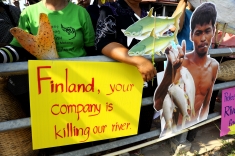Finnish Firm Pöyry Defends Role in Approval of Massive Dam in Laos
This article was published in the South China Morning Post on November 22, 2012.
The consulting firm that gave Laos a green light for a controversial dam on the Mekong River, despite objections from downstream nations, is defending its role in the project, even as the Finnish government considers an ethics complaint against the company.
Critics including environmental groups and other NGOs have slammed the Finnish firm, Pöyry, after it issued a report that concluded the Xayaburi dam project was in compliance with Laos' obligations to fellow members of the Mekong River Commission, the international body that oversees the crucial waterway.
Otto Bruun, the campaign manager of Friends of the Earth Finland said: "The company is fuelling a water conflict. This is bound to lead to serious negative human rights and environmental impact in the region."
This month, Pöyry Energy was awarded a new contract to supervise the Xayaburi dam's design and engineering over the eight-year construction period. The contract prompted accusations of a conflict of interest regarding its earlier report.
The November 2011 report, commissioned by Laos, said that other commission members and stakeholders had been adequately consulted and the Xayaburi dam could proceed without the commission's further approval.
But the commission was in deadlock, with downstream members Cambodia and Vietnam firmly opposed to the US$3.5 billion dam's construction and insisting the consultation process was not finished. Commission statements confirm that no consensus was ever achieved.
Lam Thi Thu Suu, co-ordinator of the Vietnam Rivers Network said: "Pöyry's misleading information about the impact of the Xayaburi Dam has prevented co-operation in sharing water resources from advancing."
Pöyry's assessment that the MRC consultation was concluded was widely cited by Laos in discussions with project developers and potential buyers of the power to be generated by the massive hydroelectric scheme.
Laos must "honour its undertakings made to other member states of the MRC," urged Sanna Pulkkinen, a Mekong specialist at the Finnish Ministry of Foreign Affairs, representing the largest aid donor to the commission.
Friends of the Earth and 14 other NGOs filed an ethics complaint against Pöyry Plc and the Pöyry Group. Finland's Minister of Employment and the Economy, Lauri Ihalainen, last month decided the complaint would proceed.
Bruun, of Friends of the Earth, said: "The company reaped a lucrative eight-year reward for its deceptive conduct as a consultant. This conflict of interest is an outrage."
A Pöyry spokesman said there was no breach of ethics.
"We would like to stress that Pöyry has no conflict of interest in the Xayaburi project," said Petteri Harkki, the president of Pöyry Energy Asia in Bangkok. "It was natural that we would be willing to continue in the project, since this way we can make sure that our recommendations are properly implemented."
Laos, one of the world's poorest countries, aspires to be the "battery of Asia" with its hydropower product and hopes to sell the electricity generated to Thailand.
But scientists have warned that if the dam goes ahead, it could trigger a dam-building spree on the Mekong, with up to 11 having potentially catastrophic environmental effects. The Mekong is the world's greatest inland fishery, providing food for 60 million people, according to the Mekong River Commission.
Pöyry said that 40 more environmental and cross-border impact studies would be undertaken, but that they could be done during construction.
The commission's own expert review of the Pöyry report rejected that approach. "It is strongly recommended to undertake baseline investigations before construction," the commission's review said.
In response to criticism of the project this year, Pöyry agreed to upgrade the dam design to allow the free movement of fish, which will add US$100 million to the dam's cost.
"We believe that by applying state-of-the-art design, the environmental impact of the project can be considerably mitigated," said Harkki.
Fisheries experts were not convinced.
Dr Eric Baran, a scientist at the non-profit World Fish Centre in Phnom Penh, said: "Nowhere in the tropics has a successful fish passage been built for a dam the size of Xayaburi."
- IR Blog: Days After Xayaburi Gets Green Light, Pöyry Flaunts Project's Corruption (12 November 2012)
- Press Release: Finland To Investigate Pöyry’s Role in Xayaburi Dam (31 October 2012)
- IR Blog: Pöyry Responds on its Role in the Xayaburi Dam (27 August 2012)



